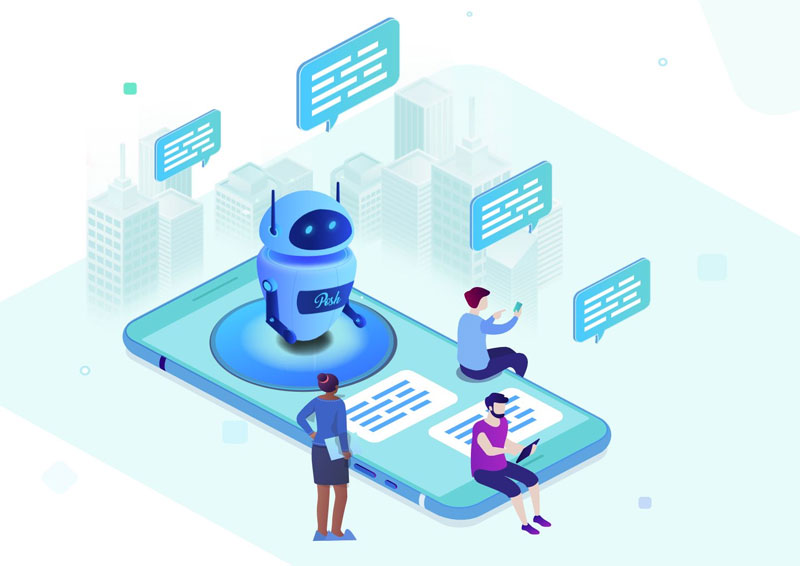Every year, Artificial Intelligence increases its impact on businesses. Even though AI technology is still evolving, we have already been in touch with numerous AI applications in our day-to-day lives. Still, many people are wary of the real-life implications of AI and automation.
As the impact of Artificial Intelligence grows, lead generation professionals may wonder – will AI replace call center agents?

Let’s cut right to the chase: is it possible for Artificial Intelligence to replace emotional intelligence and replace human agents in call centers? The short answer is no, not really.
And of course, the short answer doesn’t quite tell the whole story. Despite the continued importance of human agents and managers in call center, AI is playing a more prominent part in the operations of the next-generation call centers. But in the process, it is in fact replacing just some of the agents’ responsibilities.
Let’s dive deeper. Today’s AI solutions for contact centers may be taking over certain parts of call center operations, including part or even all of a customer call, but they’re not replacing human agents as a whole. In simple words, there’s still a lot that AI call centers can’t do. There is and always will be a need for human action in the call center. Thus, instead of replacing agents, AI is augmenting their work, making agents’ jobs more accessible, more efficient, and effective.
In fact, a contact center is an ideal place for automation to work in sync with human employees. The daily operations of call center agents can be quite repetitive and even tedious without the right tools and processes. Eliminating many of these tedious tasks is one of the things that AI does best. So, ultimately, rather than replacing agents, AI might be a contact center’s best bet for retaining them. In turn, automation plays a critical role in scaling call center operations.

AI powered contact centers are call centers on steroids
The days of providing customer service solely through inbound and outbound calls are gone. Instead, the growing customer expectations require various forms of communication leading to the emergence of advanced call centers. These call centers of the future will use all possible forms to address customer queries and complaints quickly, efficiently, and in a personalized manner. Let’s go through some of the trends that influence and improve the quality of customer service with the power of AI tools.
Voice Analysis Software
AI makes it possible to record your call center interactions and convert the audio into text transcripts faster than ever. Plus, speech analytics software analyzes your transcripts to discover common themes between calls, identify keywords, and monitor agent performance. Your business can quickly access useful data to develop informed strategies and track progress in an easy-to-use digital interface.
Human-Agent Augmentation
AI can help your human agents effectively respond to customer calls by listening to the conversation and providing useful information quickly. The technology operates behind the scenes to pull up helpful data based on the conversation or suggest a handful of solutions based on the customer’s problem. This way, your call center retains its human touch while benefiting from AI advancements.
AI Is vital to Customer Success
Customer experience is now the top brand differentiator in many industries, outweighing price, product quality, and all other factors. For example, 54% of consumers told OnePoll researchers that they would consider dropping a brand after a single bad experience. With contact center agents overwhelmed, customers are experiencing long hold times.
Conversational AI can offload many of the high-frequency, low-complexity inquiries through the use of smart bots that enable fast and accurate self-service.
AI Can Make Agents Smarter
Customers expect agents to have the right answers to their inquiries 100 percent of the time but getting that answer often requires the agent to put the customer on hold to search for information in other systems. AI engines can aggregate information from multiple systems and prompt agents with recommended responses.
For example, many of the largest contact center vendors, including Cisco, Five9, and Amazon Connect, have features that provide automated assistance, contextual recommendations, and recommendations for actions to take during live interactions.
But how hard is Artificial Intelligence to deploy?

The barrier to getting AI into the contact center was indeed higher, as companies had to hire data scientists and create their own machine learning algorithms. Today, contact center providers have done much of the heavy lifting, integrating AI directly into their platforms and removing any burden from the customer.
At the same time, many conventional contact center capabilities have been infused with AI to improve functionality that requires no intervention from the business at all. For example, modern call routing algorithms use some level of AI, which helps them get better at sending customers to the right places.
Chatbots now interpret natural language, enabling customers to type requests instead of having to pick from a menu of responses.
The biggest advancement in the rollout of AI is the cloud. Older, on-premises contact center platforms had monolithic software stacks that required large updates to bring in just a handful of improvements. Because of this, companies tended to upgrade only on a periodic basis. With the cloud, contact center providers can move to a continuous innovation model and add capabilities daily if they choose to. Customers have access to new features immediately, without businesses having to go through tedious, and often risky, software upgrades.
Artificial Intelligence is here and technology is advancing quickly in contact centers. Businesses should expect to see an acceleration of features moving forward.





